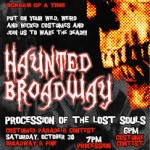Review: Money Changes Everything by Rachel Atkins. Directed by Daniel Morris. With Lisa Branham, Curtis Eastwood, Laurence Hughes, Brandon Ryan, Gina Marie Russell. Now through November 20 at The Annex Theatre.
 |
| Top to bottom, Brandon Ryan, Lisa Branham, Laurence Hughes in Annex’s “Money Changes Everything” by Rachel Atkins. Photo by |
I like the people at the Annex Theater and they put on some interesting, daring and original productions by engaging new playwrights, but they do have a tendency to stage plays that really should be tv shows or movies. In the recent past, they have staged several shows that tended towards the fantastical and science fiction genres. With their new play, “Money Changes Everything” they’ve turned their sights to True-Life Crime and it’s a welcome change from SciFi/Dystopic Land but they’ve still staged a show that would work better as a TV movie of the week, than as a legitimate stage piece. “Money” is based on a true story, and it’s an interesting tale with fascinating larger than life characters and situations, and more twists and turns than an episode of “Mission: Impossible”. There’s some snappy dialogue, genuine (dark) humor, and an engaging sense of comic irony to this piece. It has a lot of promise. It was also two hours and twenty minutes long, (PLUS a 15 minute intermission). Crime shows on television run an hour with commercials and those entertainingly corny TV Movies of the Week usually ran an hour and a half to two hours with commercials, meaning they were really 65 to 100 minutes long at best. I’m convinced there is a snappy, sharp 100 – 120 minute play in the 140 minute long slog that is “Money Changes Everything”. Playwright Rachel Atkins has talent. She needs to use that talent and sit down with an experienced dramaturge and cut out a good thirty to forty minutes from this play. There’s a small gem in there somewhere, but a lot of unnecessary muck needs to be hacked off before it can be exposed to the light of day.
“Money Changes Everything” is based on the very true story of the notorious Loomis Fargo vault robbery in Charlotte, North Carolina in October 1997. An inside job, the 8 principle thieves netted $17.3 million and they made a pact that they would “sit on the money” for a year or two as not to draw attention to themselves. Steve Ghantt, the inside man, fled to Mexico to hide out, with only $50,000 (the maximum allowed to take over the border) while the ringleader, Steve Chambers would hide the bulk of the money but would periodically send Ghantt more cash for living expenses. But Chambers was a serial criminal with a long record and had no intention of cutting Ghantt in on any of the money. In fact, Chambers broke his own rule about “sitting” on the money and began spending huge sums of the cash on cars, jewels, and a luxurious new home in an exclusive gated community. When Ghantt began to complain he was being ignored, Chambers plotted to have him killed. The Feds had long suspected Ghantt was responsible, and after Chambers and some of the others began flaunting their new wealth, there was soon enough evidence to arrest the 8 main conspirators as well as additional family members who had abetted the original gang. All were convicted and sentenced to jail terms and the media had a field day with the “Hillbilly” bank robbers who blew their money on tacky junk and ostentatiously unlikely lifestyles for their social class.
Ms Atkins follows the facts of the story very closely, only changing the names and limiting the number of characters by creating composites. Steve Chambers is now “Mitch DeWitt” who convinces his mistress, Lou Spinks to seduce the dimwitted and dissatisfied vault supervisor Kevin Laney and talk him into being the inside man to physically take the money. The twitchy, lovestruck Kevin falls under Lou’s spell and agrees to commit the crime with the aid of Mitch, Lou and Mitch’s good hearted cousin, Scott Price. He flees to Cozumel with $50k and the hope that Lou will soon join him. Meanwhile, the two FBI agents, Roscoe and Wilson, begin the investigation into the crime and Wilson begins to develop feelings for Kevin Laney’s devastated wife, (who was not in on the plan). Weeks pass and Kevin begins to panic as his money dwindles and Lou continues to make excuses to avoid meeting him. Meanwhile, Mitch and his trashy wife Candy are living the high life, spending millions of dollars and drawing attention to themselves, while Lou and Scott begin feeling guilty about their part in the crime. Irritated by Kevin’s demands and worried that he is a weak link, Mitch hires his redneck friend Mack to travel to Mexico to kill Kevin. Mack’s an inept assassin and before he can complete his assignment, the feds have gathered enough evidence to indict the conspirators. A relieved Kevin, (he was aware that he was targeted to be killed) is overjoyed to be caught and returned to American soil. He ends the play, proud that he accomplished something with his life; he’ll be famous for the rest of his life that he was the principle criminal in the 2nd biggest American bank robbery of all time.
It’s a juicy story and ripe for dramatization but the events are cinematic rather than theatrical. The build up is slow, the crime itself is laboriously recreated, and the events after the crime are also treated at great length. Once the characters of the two FBI agents are added and their investigation, the show becomes bogged down in unnecessary repetitions and too much detail. Events that would be best handled with a montage in a film aren’t easy to duplicate on the stage. By the end of the first act, the pace was lethargic and the story was only half told. And, the addition of interview segments, sprinkled throughout the show with the characters giving testimony on a television program that looks back on the crimes, didn’t help. They might have worked in a tightly written, photographed and edited film, but they didn’t work in a flabby stage production. (This story actually seems tailor made for the Coen brothers…)
And, there are other problems with the script as well. The two FBI agents are broadly drawn and the investigation scenes are unrealistic. It’s implied in the play that these two rather dimwitted agents are the only investigators (barely) working on this case, when of course there would have been dozens of Federal agents assigned to it. And, the senior agent, Roscoe is written too comically and hickish; it doesn’t help that Curtis Eastwood’s performance is way too over the top and buffoonish.
That’s another downfall of this play. Part of the problem lies in the writing, but there are also some performance issues. Mr Eastwood is having a good time chewing the scenery but he is also well matched there with Brandon Felker’s good ole boy assassin, Mack who must be descended from inbred cast mates from “Hee-Haw”, and Gina Marie Russell as the mercenary and perpetually tacky wife, Candy, of ringleader Mitch. The characters are written too stereotypically and the performances don’t attempt to underplay this weakness…they’re just too big, too loud and too cornpone to have any basis in reality. They can be funny, but they never seem like real people, and they don’t mesh well with some of the more naturalistic performances.
And, one actor who seems to relish venturing into the unreal, is Brandon Ryan’s Kevin Laney. He twitches, and spins, and fidgets, and froths, and his eyes dart, and his tongue does this weird, unsettling lizard thing…if I didn’t know better, I’d say his character must either be possessed by the Holy Rollers, or maybe he just has a case of Tourette’s. Whatever it was, it was off-putting at its most excessive. Yet, when Mr Ryan was keeping the mannerisms under control, and allowing himself to be genuine and real, his performance could be charming, touching, and a pleasure to behold. At times, I believed in his Kevin Laney and felt empathy and understanding and compassion for the man and that was based in Mr Ryan’s performance. Then, it would be Jerry Lee Lewis Twitchfest time, and I wanted to call for a medic and a shot of Thorazine. I think Mr Ryan is an actor with talent…I also think he needs to go to a good, strict, disciplined acting school and have all the bad acting schtick beat out of him by a Teutonic acting teacher with an Otto Preminger complex.
To make matters even more confusing, there were several performances in this play I enjoyed very much. Ringleader Mitch Dewitt was subtly and charmingly but menacingly played by Laurence Hughes. My main problem was with the character, and not the actor. For being the mastermind behind the crime, his character is curiously underwritten and a bit dry…instead of the numerous scenes with Kevin in Mexico, I would have liked a bit more insight into Mitch and his motivations which would have given Mr Hughes more interesting scenes to play. The same is true of Lisa Branham’s Lou Spinks. Ms Branham gave my favorite performance in the show, playing the brass and the sass and the vigor and sexuality of the character but not afraid to show her softer and more fragile sides and the ambiguity of her situation. I would have liked to have seen more scenes that allowed this character a chance to be better explored.
Also fine, in ensemble roles, were Devin Rodger in contrasting roles as Kevin Laney’s loyal and distraught wife and a sultry, but friendly Mexican waitress and Bob Williams as Scott Price, the nice guy accomplice and cousin to Mitch, and as a loyal Mexican hotel employee. Both actors nicely underplayed their roles, and delivered multiple believable performances. I also liked Jesse Lee Keeter’s Agent Wilson, but the part was poorly conceived, part “nice” guy and part bumbling detective and Mr Keeter made a nice calming foil to the boisterousness of Mr Eastwood’s grating hick.
Tech wise, the show was solid with a typically smart, multi-functional set by Peter Frost; the Annex are masters of designing and building sets that work in their small space. Lighting, sound and costumes were all effective and well-conceived.
I like the idea of this play and I liked many of the characterizations and lines in it. The basic plot is very much suited for dramatization…I’m just not convinced that it should be a STAGE dramatization. With a lot of rewriting and trimming though, I think it could be a powerfully funny but poignant black comedy. Cut half an hour out of it, and I’d be happy to come back and give it another whirl…
– Michael Strangeways














